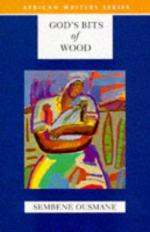|
This section contains 665 words (approx. 2 pages at 400 words per page) |

|
God's Bits of Wood Summary & Study Guide Description
God's Bits of Wood Summary & Study Guide includes comprehensive information and analysis to help you understand the book. This study guide contains the following sections:
This detailed literature summary also contains Topics for Discussion and a Free Quiz on God's Bits of Wood by Ousmane Sembène.
A large cast of characters plays out a complex interweaving of narrative and thematic lines in this fact-based novel. As oppressed male black railroad workers in French colonial Africa struggle to improve their economic and social status, their women who, in many ways, are just as oppressed by tribal and ethnic traditions, struggle to improve their own status, within both their communities and their families. This pursuit of simultaneous personal and communal integrity is the novel's anchoring thematic concern, manifesting in both character transformation and plot.
The narrative begins with a poetically written description of the land in which the story unfolds, a glimpse of nature that provides a vivid contrast to the machine-defined lives the novel's many characters live. From that broad perspective, the narrative zooms on on a particular home, that of the family of Bakayoko, a respected and almost revered union leader. Narration reveals that he and other members of the railway workers union are about to go on strike for better wages and benefits, and also reveals that the women in their lives are somewhat reluctant to go along, given that they fell they will be left with the responsibility of keeping the family homes functioning under increasingly trying circumstances. Bakayoko himself remains physically absent for much of the strike (and indeed for approximately two thirds of the narrative), a main character whose ideas both move and encourage the strikers but whose influence is felt, at least initially, mostly in spite of his absence.
As the action moves back and forth between the Bakayoko family home in Bamako, the base of many of the workers in Thies, and the seat of white power in Dakar, the narrative explores the lives and relationships of its various characters. There are Bakayoko's fellow union leaders (the sensible Lahbib and the practical Doudou), members of the union with different perspectives on the strike (the enthusiastic Samba, the aggressive Tiemoko, the sullen and superficial Beaugosse), and members of management (the judgmental Dejean, drunken Isnard, and idealistic Pierre). There is also a group of increasingly empowered women - the aggressive Penda, the fed-up Ramatoulaye, the disdainful and ambitious N'Deye Touti, the blind and soulful Maimouna, the precocious Ad'jibid'ji.
Men and women alike find themselves profoundly challenged by the circumstances and results of the strike. Water and food become scarce, violence occasionally surges, and a series of increasingly intense confrontations results in a string of deaths, including that of Bakayoko's mother. Eventually, Bakayoko is forced to return to his homeland after a long time away, taking what he and others believe to be his rightful place at the head of the strike movement. When his negotiations with management get nowhere (at least partly because of his inability to control his temper and his words), the women take matters into their own hands, planning a sixty kilometer march from Thies to Dakar.
With the organizational help of the men, the women set off on their march, overcoming obstacles presented by weather, fatigue and hunger to gather more and more supporters, and eventually arrive in the heart of Dakar. There they are met by influential traditionalists who warn them against behaving in such an outrageous, unfeminine way, but are encouraged by Bakayoko, whose powerful speech to the crowd inspires a national general strike which, in turn, makes the union and government authorities back down.
Seeing the human effects of both the strike and its aftermath leads Bakayoko to the decision to stay home with his family rather than continue his travels. Meanwhile, in the enclosed French community outside Dakar, a small group of French leaders is holed up, resisting orders to leave their positions and return home. One of them, in a fit of temper, grabs a gun and runs outside, only to be shot. And in the silence that follows, from the crowd of women protestors surrounding the community, a solitary voice sings a song in praise of "the man who does battle without hatred".
Read more from the Study Guide
|
This section contains 665 words (approx. 2 pages at 400 words per page) |

|



